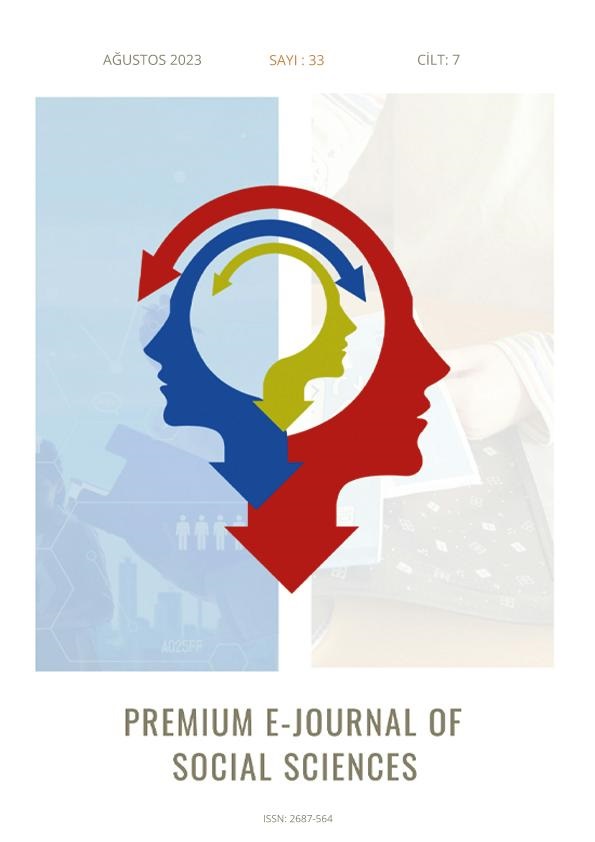Investigation of the Job Satisfaction Levels of the Teachers Working in the Earthquake Region After the 6th February Earthquake, in Terms of Various Variables
DOI:
https://doi.org/10.5281/zenodo.8271019Keywords:
Kahramanmaraş Earthquakes, Teachers, Job Satisfaction Level, MinnesotaAbstract
Recorded as the epicenter of Pazarcık District of Kahramanmaraş, this 7.7 magnitude earthquake caused great destruction and loss of life in eleven provinces in southeast Turkey. On the same day, at 13.24, another 7.6 magnitude earthquake with the epicenter of Kahramanmaraş-Elbistan occurred and similarly, loss of life and property was ex̄ perienced. These two major earthquakes and the subsequent aftershocks triggered feelings of pain, fear and helplessness among the people in the region.
The aim of this study is to investigate the job satisfaction levels of teachers in terms of various variables after the February 6 Kahramanmaraş Earthquakes. Investigating the job satisfaction levels of post-disaster teachers is of great importance both for the teachers themselves and for the development of post-disaster education processes.
The data obtained from the Minnesota Job Satisfaction Scale and demographic variables were used in the study conducted with 110 teachers who worked immediately after the February 6 Kahramanmaraş Earthquake.
From the data obtained, the job satisfaction levels of teachers; It was concluded that there is a significant relationship between gender, marital status, type of institution, branch, and choice of profession.
Training teachers in coping with post-disaster students, providing psychosocial support, and responding to traumatic ex̄ periences can help them do their jobs more effectively.
Downloads
References
Bateman, A. ve Robinson, P. (2020). The Christchurch earthquake: Lessons from the real-life ex̄ periences of early childhood teachers. J. Early Child. Teach. Educ. 41, 325–337.
Cook, J. D. & Bickman, L. (1990). Social support and psychological symptomatology following a natural disaster. Journal of Traumatic Stress, 3(4), 541-556.
Duruel, M. (2023). Kırılganlık Ve Dirençlilik Kesişiminde Yaşlıların Afet Deneyimleri Hatay Örneğinde 6 Şubat 2023 Depremleri. PESA Uluslararası Sosyal Araştırmalar Dergisi, 9(2), 103-120.
Erdoğan, B. (2023). Depremin Sosyolojisi: 6 Şubat Felaketinin Toplumsal ve Kültürel Boyutları. TRT Akademi, 8(18), 718-725.
Ergünay, O. (2007). Türkiye’nin afet profili. TMMOB Afet Sempozyumu, 5(7), 1-14.
Genç, F. N. (2007). Türkiye’de doğal afetler ve doğal afetlerde risk yönetimi. Stratejik Araştırmalar Dergisi, 9(5), 201-226.
Guest, G., Bunce, A. & Johnson, L. (2006). How Many Interviews are Enough? An Ex̄ periment with Data Saturation and Variability. Field Methods 18, 59–82.
İşçi, C. (2008). Deprem Nedir Ve Nasıl Korunuruz? Journal of Yasar University, 3(9), 959-983.
Jogia, J., Kulatunga, U., Yates, G. P. & Wedawatta, G. (2014). Culture and the psychological impacts of natural disasters: Implications for disaster management and disaster mental health. Built and human environment review, 7(1), 1.
Karabulut, D. & Bekler, T. (2019). Doğal afetlerin çocuklar ve ergenler üzerindeki etkileri. Doğal Afetler ve Çevre Dergisi, 5(2), 368-376.
Karasar, N. (2012). Bilimsel Araştırma Yöntemleri. Nobel Yayın Dağıtım.
Kukuoğlu, A. (2018). Doğal Afetler Sonrasi Yaşanan Travmalar Ve Örnek Bir Psikoeğitim Programi. Afet ve Risk Dergisi, 1(1), 39-52.
Leon, G. R. (2004). Overview of the psychosocial impact of disasters. Prehospital and disaster medicine, 19(1), 4-9.
Lindell, M. K. & Prater, C. S. (2003). Assessing community impacts of natural disasters. Natural hazards review, 4(4), 176-185.
Marangoz, M. & İzci, Ç. (2023). Doğal Afetlerin Ekonomik, Sosyal ve Çevresel Etkilerinin 6 Şubat 2023 Kahramanmaraş Merkezli Depremler Bağlamında Girişimciler Açısından Değerlendirilmesi. Sosyal ve Beşeri Bilimler Araştırmaları Dergisi, 24(52), 1-30.
Mooney, M., Tarrant, R., Paton, D., Johnston, D. & Johal, S. (2021).The school community contributes to how children cope effectively with a disaster. Pastor. Care Educ. 39, 24–47.
Newnham, E. A., Gao, X̄ ., Tearne, J., Guragain, B., Jiao, F., Ghimire, L., ... & Leaning, J. (2020). Adolescents’ perspectives on the psychological effects of natural disasters in China and Nepal. Transcultural psychiatry, 57(1), 197-211.
O’Toole, V. M. & Friesen, M. D. (2016). Teachers as first responders in tragedy: The role of emotion in teacher adjustment eighteen months post-earthquake. Teaching and Teacher Education, 59, 57-67.
Özdal, A. (2023). 06 Şubat 2023 Kahramanmaraş Depremi Ağıt-Destanlarının İşlevsel Analizi. Korkut Ata Türkiyat Araştırmaları Dergisi, (11), 390-406.
Saeed, S. A. & Gargano, S. P. (2022). Natural disasters and mental health. International review of psychiatry, 34(1), 16-25.
Sandhu, D. & Kaur, S. (2013). Psychological impacts of natural disasters. Indian Journal of Health and Wellbeing, 4(6), 1317.
Şahin, N.H., Yılmaz, B. ve Batıgün, A. (2011). Marmara Depremi Sonrası Çocuklar ve Yetişkinler İçin Psikoeğitim: Bir Değerlendirme Çalışması. Travmatoloji 17, 41–49.
Şenol, A. F. (2023, April). Kahramanmaraş Depremleri (6 Şubat 2023) Sonrası Hatay İlindeki Yapıların Hasar Durumlarının Değerlendirilmesi. In International Conference on Engineering, Natural and Social Sciences (Vol. 1, pp. 75-80).
Sönmez V. & Alacapınar F.G. (2013). Örneklendirilmiş Bilimsel Araştırma Yöntemleri. Anı Yayıncılık.
Utkucu, M., Durmuş, H., Uzunca, F. & Nalbant, S. (2023). 6 Şubat 2023 Gaziantep (Mw= 7.7) Ve Elbistan (Mw= 7.5) Depremleri Üzerine Bir Değerlendirme. Sakarya Üniversitesi Afet Yönetim ve Araştırma Merkezi, Sakarya Şubat.
Ünlügenç, U. C., Akıncı, A. C., & Öçgün, A. G. 6 Şubat 2023 Kahramanmaraş-Gaziantep Depremleri; Adana İli ve Yakın Kesimlerine Yansımaları. Geosound, 57(1), 1-41.
Werg, J., Grothmann, T., & Schmidt, P. (2013). Assessing social capacity and vulnerability of private households to natural hazards–integrating psychological and governance factors. Natural Hazards and Earth System Sciences, 13(6), 1613-1628.
Yıldırım, S. (2023). 6 Şubat Kahramanmaraş Depreminin Psikososyal Etkisi Ve Depremzedelere Yönelik Sürdürülebilir Müdahalenin Önemi Üzerine Bir Gözlem Araştırması. Anasay, (24), 133-153.
Downloads
Published
How to Cite
Issue
Section
License
Copyright (c) 2023 Premium e-Journal of Social Science (PEJOSS)

This work is licensed under a Creative Commons Attribution 4.0 International License.


